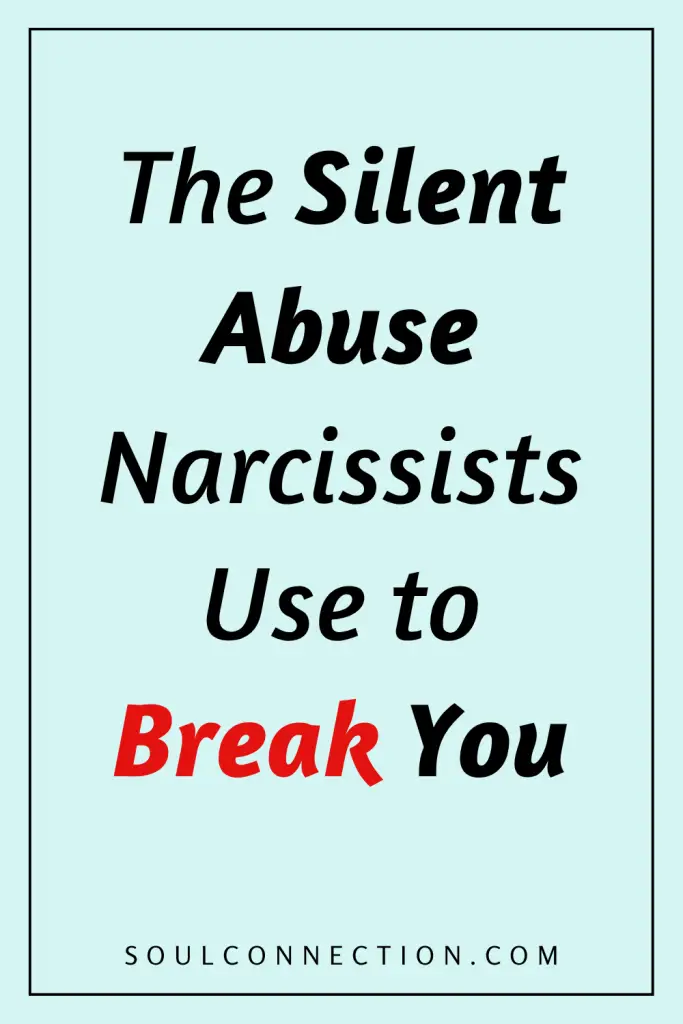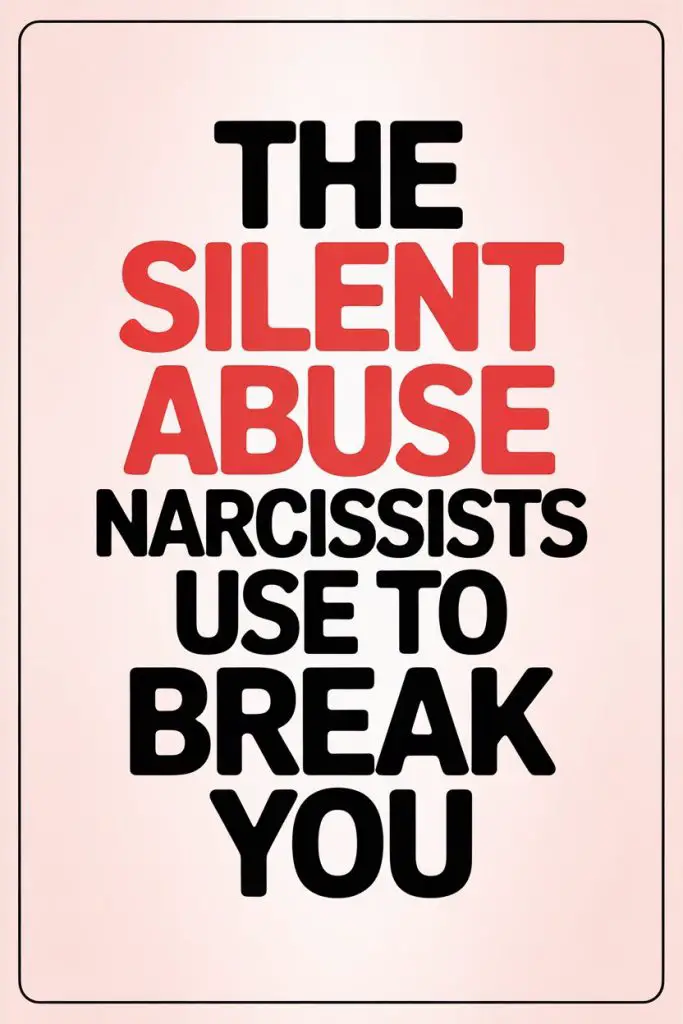Narcissists rarely smash windows or shout down the street. Most of the time, their worst weapons are quiet, subtle, and almost invisible until you’re tangled up and wondering what happened to your sense of self.
The abuse isn’t just silent—it’s sneaky, corrosive, and can have you doubting reality itself.
If you’ve ever felt like you’re losing yourself in a relationship, or you find yourself apologizing for things you can’t even remember doing, you might be staring this silent beast straight in the eyes.
Let’s unpack the hushed tactics narcissists use to take you apart, and—most importantly—how you can start putting yourself back together.
Whispered Lies and the Erosion of Reality
Gaslighting is a term that gets tossed around more than salad at a summer BBQ, but it’s at the heart of narcissistic abuse. This is where the narcissist gently, persistently convinces you that your memories, feelings, or instincts are off the mark.
Did he really raise his voice last night, or are you just too sensitive? Are you sure she said that cruel thing, or are you misremembering?
Over time, this is how someone can end up accepting a version of reality that’s twisted to suit the narcissist’s needs.
Most people don’t realize it’s happening until they’re already questioning their sanity. It’s not the wild, obvious kind of lying—it’s the “Are you sure?” said with a smile, the “You always overreact,” tossed out over breakfast.
Little by little, your grip on your own truth starts to slip.
Withholding: Love, Affection, and Approval as Currency
Affection should be freely given. To a narcissist, though, it’s doled out like rations in a siege. One minute you’re basking in their warmth, the next you’re shivering in the emotional freezer and you’re not sure what you did wrong.
This is called “withholding,” and it’s one of the quietest forms of control.
A narcissist treats love, sex, attention, or even basic kindness as something you must earn. If you don’t dance to their tune, the good stuff dries up.
This keeps you forever hustling for approval, desperate to thaw the chill, and blaming yourself for not being “good enough.” It’s exhausting, and it keeps you stuck.
The Disappearing Act: Stonewalling and the Silent Treatment
Nothing says “I’m in charge here” like total radio silence. Narcissists are experts at disappearing emotionally, sometimes physically, when you need them most.
They can switch from chatting away about the weather to refusing to answer your texts for days—just because you dared bring up something uncomfortable.
Stonewalling and the silent treatment aren’t just childish; they’re punishing. The goal is to make you feel abandoned, desperate to fix the situation, and hungry for their attention again.
You end up apologizing for things you didn’t do, just to restore a sense of connection.
Subtle Critiques That Wear You Down
Everyone needs a little constructive criticism now and then. With a narcissist, though, feedback becomes a slow, steady drip of poison.
It’s not the dramatic put-down in public—it’s the understated “Are you really wearing that?” or “Well, you’re not as outgoing as my ex.”
This kind of criticism is designed to sneak under your skin and fester until you start believing it. Suddenly, you’re editing yourself before you even open your mouth, and you start to see yourself through their unkind lens.
Your confidence takes a hit, your self-esteem plummets, and they’ve got all the power.
Blame Shifting and the Art of Twisting Reality
Narcissists are rarely—if ever—wrong. If you catch them in a mistake, you’ll find yourself in a logic maze quicker than you can say “gas bill.”
Suddenly, you’re apologizing for their bad day, their cruel words, or even their cheating. It’s a masterclass in blame shifting.
These folks can turn any conversation on its head, making you feel responsible for things you had no control over. You might start to believe you’re always the problem, which is exactly where they want you.
Triangulation: Creating Jealousy and Insecurity
If you ever feel like there’s always a third person in your relationship—even if they’re only there in stories—you may be on the receiving end of triangulation.
Narcissists love to stir up insecurity by comparing you to others (“My ex never made such a fuss”), flirting with someone else in front of you, or even bringing in a friend or family member to “back them up.”
Why? Because insecurity makes you easier to control. The more you chase their approval, the more power they wield.
Chronic Minimization and Dismissal
Ever try to tell a narcissist how you feel? If your emotional needs are consistently brushed off with “You’re overreacting,” or “It’s not a big deal,” that’s chronic minimization.
Your feelings are inconvenient to them, so they sweep them under the rug.
You end up bottling up your emotions, doubting whether you’re allowed to feel them in the first place. Over time, this leads to emotional numbness—something many people don’t even realize is a symptom of long-term emotional abuse.
Micro-Management of Your Time and Choices
Silent abuse also comes disguised as “helpfulness.” A narcissist may quietly undermine your choices, double-check your plans, or suggest (with a smile) that you’d be better off canceling your night out.
It’s all about subtle control: who you see, what you wear, how you spend your time.
The push isn’t always obvious. Sometimes it’s a guilt trip: “I just worry when you go out without me.” Other times, it’s a “thoughtful” reminder that you’re just not good at certain things.
Before long, your world shrinks, and they’re at the center.
Manipulating Empathy and Playing the Victim
Narcissists have a flare for melodrama when it serves their needs. If they sense you’re pulling away, out comes the sob story. Suddenly, they’re the one who’s hurt, misunderstood, or abandoned.
They’ll dredge up their own traumas or invent new grievances to keep your focus on them and your guilt working overtime.
This is classic manipulation: your empathy gets hijacked, and you’re guilted into staying, fixing things, or putting your own needs last.
Disguised ‘Jokes’ and Backhanded Compliments
Passive-aggressive digs are a narcissist’s bread and butter. Maybe it’s a “joke” about your driving skills at a dinner party, or a “compliment” about how you look so much better now that you’ve lost weight.
These remarks are meant to sting, but the kicker? If you call them out, you’re told you’re too sensitive.
It’s a double-bind: laugh along and swallow the hurt, or speak up and get accused of having no sense of humor. Either way, your self-worth takes a knock.
The Slow Isolation from Friends and Family
One of the sneakiest tricks in the narcissist’s playbook is the slow, quiet isolation from your support system. It starts with a gentle “I just want to spend more time with you,” or a subtle hint that your friend doesn’t really have your best interests at heart.
Bit by bit, your social circle shrinks. The less time you spend with people who care about you, the easier it becomes for the narcissist to shape your reality.
Isolation doesn’t always look like locked doors—it can be a thousand small choices, each one chipping away at your independence.
Spotting Silent Abuse and Reclaiming Your Voice
Recognizing these tactics is like switching on a light in a dim room. If you’re nodding along to more than a couple of these points, you’re not imagining things—and you’re definitely not weak or crazy.
What can you do tonight, besides eating an entire pizza and rage-texting your best mate?
- Keep a private journal of things said and done. Not for court, but for your own reality check.
- Start reconnecting with friends or family, even if it’s just a quick message.
- Set one small boundary. Maybe you don’t answer a text right away, or you spend an hour doing something just for you.
- Seek out a therapist who gets narcissistic abuse. The right support can help you untangle the knot and rebuild your confidence.
You Deserve More Than Silent Suffering
Silent abuse leaves scars that no one can see, but they’re real—and you don’t have to face them alone. The trickiest part is recognizing it for what it is. Once you do, you’re already on the path out.
Your voice matters. Your feelings are valid. No amount of whispered lies or cool silences can change that.
And if you’re waiting for permission to say enough’s enough? Consider it granted.


